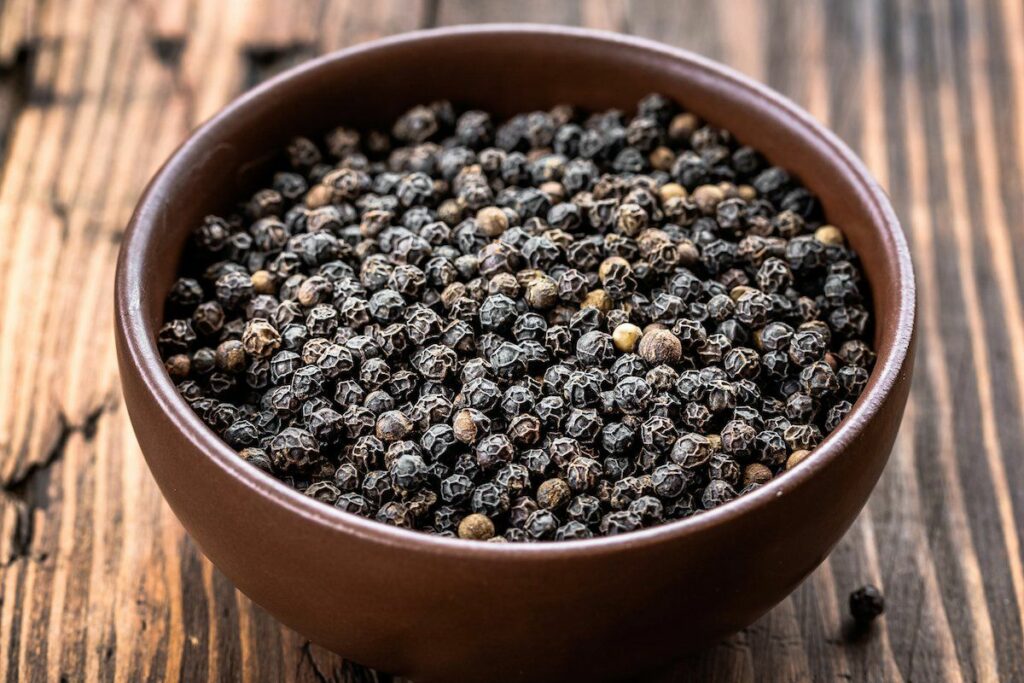Black pepper is one of the most commonly used spices in kitchens around the world. It is derived from the peppercorn plant, scientifically known as Piper nigrum. Apart from being a popular culinary ingredient, black pepper also offers various potential health benefits. However, like any other food item, it is important to understand its nutritional composition, potential health effects, and recommended uses. In this comprehensive guide, we will delve into the topic of black pepper and explore its nutritional value, health benefits, potential risks, and different ways it can be incorporated into your diet.
Nutritional Composition of Black Pepper:
Black pepper contains a range of beneficial compounds, including vitamins, minerals, and antioxidants. Although it is often used in small quantities, it can still contribute to your daily nutrient intake. Here is the approximate nutritional composition of black pepper per 100 grams:
- Calories: 255 kcal
- Carbohydrates: 64.8 grams
- Protein: 10.4 grams
- Fat: 3.3 grams
- Fiber: 26.5 grams
- Vitamin K: 163.7 micrograms
- Calcium: 44.8 milligrams
- Iron: 7.8 milligrams
- Magnesium: 171 milligrams
- Potassium: 1,329 milligrams
Health Benefits of Black Pepper:
- Antioxidant Properties: Black pepper contains potent antioxidants, such as piperine, which can help neutralize harmful free radicals in the body. Antioxidants play a vital role in reducing oxidative stress and protecting cells from damage.
- Digestive Health: Black pepper has been used for centuries in traditional medicine to aid digestion. Piperine, the active compound in black pepper, stimulates the secretion of digestive enzymes, promoting better digestion and reducing digestive discomfort.
- Enhanced Nutrient Absorption: Piperine in black pepper has also been found to enhance the absorption of certain nutrients, such as curcumin from turmeric. This synergistic effect can potentially increase the bioavailability of various beneficial compounds present in different foods.
- Anti-inflammatory Effects: Piperine possesses anti-inflammatory properties that can help reduce inflammation in the body. Chronic inflammation is linked to various health conditions, including heart disease, arthritis, and certain types of cancer.
- Respiratory Health: Black pepper has been used in traditional medicine to alleviate respiratory issues such as coughs and congestion. Its warming and expectorant properties can help loosen mucus and ease respiratory discomfort.
- Potential Anti-Cancer Effects: Some studies suggest that piperine may have anti-cancer properties. It has demonstrated the ability to inhibit the growth of certain types of cancer cells in laboratory studies. However, further research is needed to fully understand its potential role in cancer prevention and treatment.
Potential Risks and Considerations:
While black pepper is generally safe to consume for most individuals, it is important to consider a few points:
Allergies: Some people may be allergic to black pepper. If you experience any adverse reactions, such as itching, swelling, or difficulty breathing, after consuming black pepper, seek medical attention.
Gastrointestinal Issues: In rare cases, consuming excessive amounts of black pepper may cause gastrointestinal irritation, leading to symptoms such as stomach pain, diarrhea, or heartburn. Moderation is key when using black pepper in your diet.
Incorporating Black Pepper into Your Diet:
Black pepper is incredibly versatile and can be used in various culinary preparations. Here are some creative ways to incorporate black pepper into your diet:
- Seasoning: Black pepper is commonly used as a seasoning in savory dishes, including soups, stews, marinades, and sauces. It adds a unique flavor and aroma to the dishes.
- Salad Dressings: Add a pinch of black pepper to your homemade salad dressings for an extra kick of flavor.
- Roasted Vegetables: Sprinkle black pepper over roasted vegetables to enhance their taste and aroma.
- Eggs and Avocado: Black pepper pairs well with eggs and avocado, adding a zesty touch to your breakfast or brunch.
- Spice Blends: Create your own spice blends by combining black pepper with other herbs and spices like cumin, coriander, or paprika. This allows you to customize the flavors according to your preference.
Conclusion:
Black pepper is a versatile spice that not only adds flavor to your dishes but also offers potential health benefits. It contains valuable nutrients and antioxidants that support digestion, enhance nutrient absorption, and possess anti-inflammatory properties. However, as with any food, it is important to consume black pepper in moderation and be mindful of any potential allergies or gastrointestinal sensitivities. By incorporating black pepper into your diet in various creative ways, you can enjoy its distinctive taste while potentially reaping its health benefits.

